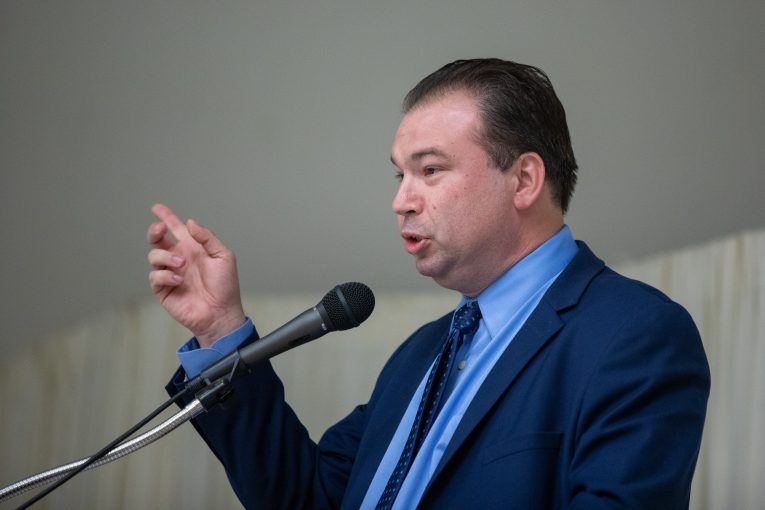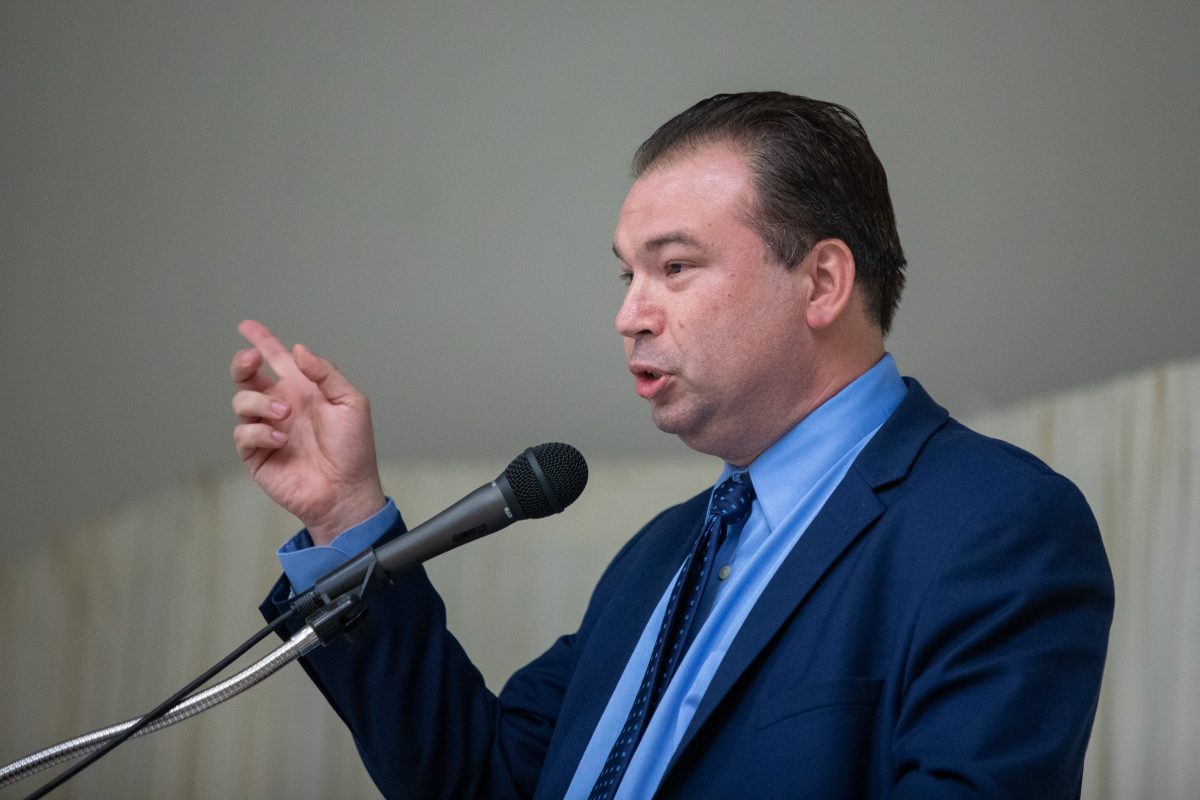

by Jeffrey Deskovic
“Looking back” will feature reprints of articles that Jeff previously wrote while a columnist at The Westchester Guardian, which encompass topics that are applicable here in CA as well as across the country and not simply applicable to NY.
I spent 16 years in prison prior to being proven innocent by DNA with the help of The Innocence Project (www.InnocenceProject.org). The testing not only showed my innocence, but it also proved the guilt of the real perpetrator, who subsequently was arrested, pled guilty, and was sentenced for the crime (www.jeffreydeskovicspeaks.org). In the slightly more than three years that I have been home, I have experienced first-hand the difficulties of reintegrating back into society.
When the average person hears an exoneration story, two thoughts usually go through their mind: horror that an innocent person was in prison wrongfully, and happiness that their ordeal is finally over. In reality, however, although the physical imprisonment is over, the ordeal has only begun. Exonerees are released with no money, and, unlike parolees, receive no assistance from the state to reintegrate back into society. Although they are able to seek compensation through lawsuits that take between 3-5 years, nothing is provided in the interim. Many states offer no compensation at all, and some that do are inadequate.
The Innocence Project recently released a report called “Making Up for Lost Time: What the Wrongfully Convicted Endure and How to Provide Fair Compensation.”
The focus of this article is to review that report and offer a critique. A quick caveat first. While I will always be grateful to The Innocence Project for winning my freedom, that does not mean that I will always agree with their recommendations, or that it is somehow disrespectful if I voice my dissent. Instead, I have become an advocate in my own right, and I owe it to the people that support my advocacy efforts, the cause, and to myself, to speak about anti-wrongful conviction issues no matter who may hold an opposite opinion.
The report recommends replacing the lawsuit system with a compensation statute that would provide $50,000 per year of wrongful incarceration, and a variety of immediate services. They write “The financial awards exonerees receive through lawsuits often surpass those available through state compensation statutes. However, lawsuits are also more expensive, and part of the award money will be spent on litigation fees. In addition, lawsuits are more time-consuming and take longer to finalize. After years of fighting to prove their innocence, exonerees need a safety net, not another long legal battle. Winning a lawsuit can’t help exonerees find jobs, counseling, medical care, educational aid and other essentials they need for a  successful transition.”
successful transition.”
I agree with their suggestions of immediate assistance: transportation, education, workforce development, physical and mental health care through the state employee’s health care system and other transitional services, immediate emergency housing, public transportation vouchers, the creation of a release plan by The Department of Social Services, and free tuition at state university. I would also add job training and placement to that list. But these should be provided in addition to what is awarded by a court which assesses lost wages, impacted future wages, pain and suffering.
Each person’s life circumstances are different; certainly the lost wages of a middle-aged adult who had dropped out of high school could not be equal to a college-educated exoneree, and certainly not to an exoneree who was a well-paid employee at the time with a solid future. The same is true of impacted future wages.
Future earnings are negatively impacted because an exoneree is not able to secure gainful employment due to lack of experience and possible mental health problems. The difference between what one could have earned and what is actually earned is vast, and justice requires that it should be made up. Similarly, although wrongful incarceration is hell for everyone, the amount of personal anguish, trauma, and psychological damage will vary. A person who was assaulted, abused, and left prison with health problems suffered more than someone who did not. Age too is a factor: a teen missing out on the normal growth that occurs during formative years is in worse shape than an adult who was fully developed at the time of the wrongful conviction. The amount of fear and vulnerability will also vary between adults and teens.
Considering that $50,000 is a mid-level paying job, this amount is inadequate on the issue of lost wages alone, let alone when one factors in impacted future wages, and pain and suffering. It is adding insult after injury for a state to tell an exoneree that the pain and suffering of wrongful imprisonment that they endured was only worth $50,000. Take someone who was wrongfully imprisoned for 20 years. Could anybody, in good conscience, say that one million dollars is adequate compensation for them? What if you, your son or daughter, had served the 20 years and were then cleared. Would you view that amount of compensation as adequate for the type of injuries suffered?
Here is another angle: take the case of an exoneree who, due to psychological problems resulting from their wrongful incarceration, is unable to work consistently and therefore permanently unable to become gainfully employed. That means that they are unable to meet their cost-of-living expenses through earned income and therefore must do so out of the compensation that they were awarded. The $50,000 per year of wrongful incarceration would be manifestly inadequate when a longer-term view is taken because they would still be in a precarious position financially, worries about their financial future would still be on their mind, and they would seem doomed to a life of poverty—all as a result of something beyond their control, being wrongfully convicted and then being inadequately compensated.
For these reasons, The Innocence Project’s recommendation should not be adopted by state legislatures. Even under the currently inadequate compensation system—which offers no immediate assistance, requires exonerees to pay the costs of litigation as well as the exploitative one third that goes to attorneys prosecuting the lawsuit, and which has somehow come to be seen as acceptable and the norm—the exoneree would still be left with more money than what they would get under the proposed $50,000 a year. Acceptance of this proposal by states would not be in the best interests of exonerees, and would not represent an effort on the part of the state to be fair and compassionate toward the people that their state wrongfully convicted and imprisoned, often for decades.
Those two above-mentioned deficiencies should be legislatively fixed. If the state loses the compensation lawsuit, they should be obligated to pay the costs of the litigation as well as the attorney fees; the exoneree should not have to part with any of the compensation that is awarded to them. After all, the amount that they are given is the amount that a court assessed would be fair and just after taking into account the individual facts and circumstances of the particular case. Subtracting fees and expenses from that amount would leave them with an amount less than that, and of a necessity is therefore unjust.
In terms of exonerees not “needing another long legal battle,” the answer is to try to quicken the time needed to litigate the compensation case, and providing immediate reintegrative services; not giving the exoneree an inadequate amount of money that does not take into account the above-mentioned factors in the name of speed.
If you agree with that The Innocence Project’s recommendation regarding $50,000 per year of wrongful incarceration is inadequate, and you do not want them to recommend this course of action to state legislatures throughout the country, please call them at 212-356-5340, ask for the policy department, and then express your concerns. Reference the arguments made in this article, lest the situation for struggling exonerees is made worse by legislative adoption of an inadequate remedy.
Those states whose laws do not currently allow for compensation should pass legislation granting it, and those states whose laws are inadequate should improve them, but that improvement should be enough to make the wrongfully convicted whole again, as best as we as a society can make them.
“Jeffrey Deskovic, Esq, MA, is an internationally recognized wrongful conviction expert and founder of The Jeffrey Deskovic Foundation for Justice, which has freed 9 wrongfully convicted people and helped pass 3 laws aimed at preventing wrongful conviction. Jeff is an advisory board member of It Could Happen To You, which has chapters in CA, NY, and PA. He serves on the Global Advisory Council for Restorative Justice International, and is a sometimes co-host and co-producer of the show, “360 Degrees of Success.” Jeff was exonerated after 16 years in prison-from age 17-32- before DNA exonerated him and identified the actual perpetrator. A short documentary about his life is entitled “Conviction“, and episode 1 of his story in Virtual Reality is called, “Once Upon A Time In Peekskill“. Jeff has a Masters Degree from the John Jay College of Criminal Justice, with his thesis written on wrongful conviction causes and reforms needed to address them, and a law degree from the Elisabeth Haub School of Law at Pace University. Jeff is now a practicing attorney.
